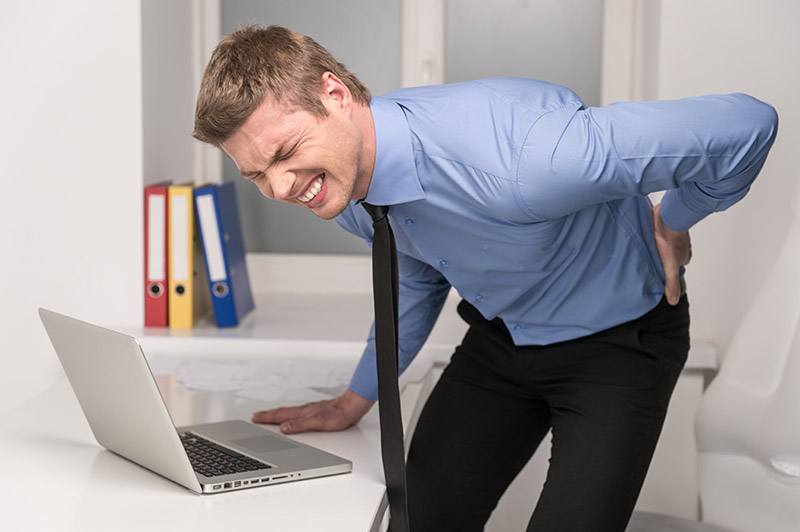A common problem that affects most people at some time, mostly in the lower back (lumbago), though can be felt anywhere in the spine. May be triggered by strained muscles, tendons or ligaments, wear and tear, bad posture, poor bending and lifting technique as well as stress. It is the leading cause of long-term sickness in UK causing more the 15 million lost work days in 2013. Although painful, it is not serious in most cases.
Symptoms: Pain, dull or sharp ache, tenderness, stiffness, weakness, numbness or tingling (can travel down the leg in sciatica and disc problems). Joint pain when walking or stiffness first thing in the morning lasting more than half an hour may be a sign of arthritis. Indication that serious problems may exist are swelling, constant pain not eased by laying down, loss of bladder or bowel control, numbness in genitals, buttock or back passage, sudden weight loss, pain in the chest, high fever or after an accident.
Causes: More serious causes are disc problems, sciatica, whiplash, frozen shoulder, ankylosing spondylitis; rare causes fracture and cancer. Most cases related to minor sprains, strains, injuries or trapped, irritated nerves. Common causes developing over time are bad posture at work, driving, on the couch, bending, lifting or twisting awkwardly, overstretching and overuse, sleeping on a poor matress. Risk factors are stress, smoking, pregnancy, overweight, long term corticosteroids.
Diagnosis: Your doctor will ask you to describe the pain and where you feel it, when it started, what makes it better or worse and if it has happened in the past; also about lifestyle and work. Examination will assess range of movement in your back, ability to lift your legs, sit, stand and walk, testing knee-jerk and ankle reflexes. You may be referred for X-ray or MRI scan.
Treatment: In short term back pain keep as active as possible, use hot and cold compression packs and over the counter painkillers. Immobility can weaken the back muscles and may hurt more in the long run. Staying relaxed and positive is important for recovery. Treatment for back pain lasting more than 6 weeks involves painkillers, exercise and manual therapy or acupuncture. In longer term back pain counselling, antidepressants or a pain clinic. Spinal surgery is only recommended when all else has failed or the pain is so severe that you cannot sleep or carry out daily activities.
Prevention: Maintain good posture at work, home and play. Learn to lift, bend and twist safely. Exercise regularly without strain. Improve flexibility and strength, particularly in core muscles. Wear suitable shoes. Learn relaxation techniques if you are stressed. Maintain a healthy weight.
Osteopathic/Manual Management: Take a detailed case history to understand the nature of the problem and surrounding issues. Examine spine and all surrounding tissues; muscles, ligaments, nerves, fascia, etc., for movement, strength and functionality and assess nerve pathways. Perform orthopaedic and neurological tests and determine the root cause. Treat to improve strength, functionality and movement and reduce tension, inflammation, pain and swelling. Postural and ergonomic advice regarding lifting, carrying, bending, twisting, sleeping, footwear, sitting at desk, car, couch, as well as rehabilitation exercises. Treatment may include manipulation, deep soft tissue massage, trigger point therapy, muscle energy techniques, fascial techniques, dry needling, etc.
We are happy to advise you on your health matters and offer a free 15 minute joint and spinal check, without obligation.
 Lin Bridgeford DO KFRP MICAK MICRA FSCCO MSc
Lin Bridgeford DO KFRP MICAK MICRA FSCCO MSc
Registered Osteopath & Kinesiologist & Yoga Teacher
Aether Bios Clinic – Saltdean
01273 309557
07710 227038

